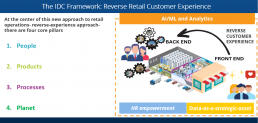“Having a purpose is more than just a statement. It should be the glue that binds everyone together in the pursuit of success. Purpose should be the guiding principle that shapes every aspect of an organization. It should be reflected in the design of products, the management of supply chains, the employee experience, the customer journey, and the relationships within the broader ecosystem.” Roberta Bigliani, Group VP, Head of Insights, IDC EMEA.
Retailers need to balance priorities to achieve a successful customer-led retail strategy. To do so, they should begin with a purpose in mind and define roles within the organization to achieve that common purpose. Customer and employee experience are among the top priorities for digital transformation among European retailers, according to the IDC Global Retail Survey, 2023. Retailers should focus on the four Ps (People, Product, Processes, Planet) of the reverse retail experience to address customer expectations and employee experience, speed up time to market, manage value chain interactions, and ensure sustainable operations.
IDC’s Reverse Experience for Customer-Led Retail
A possible strategy for CDOs is to identify key stakeholders within the organization, define strategic themes for digital transformation, get rid of silos within the organization, and reconcile the digital strategy with company culture. To support personalized and omnichannel customer journeys, retailers should leverage the right tools to integrate the four pillars through strategic planning with a long-term vision.
AI is emerging as a key tool for companies to act on their purpose, pursue strategic priorities, and enable innovation. Here below a few examples of how AI is transforming Retail:
- Generative AI for Enhanced Customer Service. Retailers can use Generative AI to generate high-quality content that meets the needs and expectations of their customers, while also reducing costs.
One of the common use cases in retail is order tracking, where customers can contact virtual agents (bots) through various channels (phone, chat, social media) to check the status of their orders.
Generative AI is transforming customer service by allowing human agents to focus on the issues that require their attention. According to industry sources, the bots can handle 80% of the cases without escalating them to human agents, which means faster and more efficient service for the customers.
- Responsible AI for Customer Trust. AI is shaping how companies communicate with customers and the extent to which they meet their expectations. Good intentions are often not good enough with AI, and the use of AI must be done responsibly with respect for human values and ethical principles.
So what can companies do to use AI responsibly? Setting out AI principles, including accountability, privacy, sustainability, safety, and inclusivity, that are applied whenever AI is used, can be a winning approach. AI trustworthiness must be ensured at each step of the customer journey to build lasting relationships with their customers.
- AI for Empowered Store Associate. AI/ML can support store associates in becoming more effective in their interaction with the customer through greater access to customer information, enabling better recommendations and offers to each customer, and increasing their satisfaction and loyalty.
Crucially AI can also simplify the life of the customer in-store, by offering them tools and features that enhance their shopping experience. For example, a leading European home improvement retailer uses mobile app gamification to prepare the shopper for the store visit, making it a more relevant and effective use of their time.
Through AI, the store associate can become more than a salesperson, but a trusted advisor and partner for the customer, who can deliver value, trust, and loyalty.
- AI for the Future of Retail. The future of retail is not only about adopting digital tools but also about transforming the mindset and culture of the organization. Retailers need to build a mindset of continuous transformation.
AI is changing the productivity paradox, speeding it up. AI, Generative AI, and advanced algorithms, applied to the whole retail business operations and functions, will enable companies to make high-volume and real-time decisions, with surgical precision, but only if supported by a comprehensive data management strategy.
Immersive experience tech, such as the Metaverse, Web3, 3D product visualization, AR/VR, and XR, will also have a role in the future of the industry because they will enable retailers to overcome the limits of traditional retail and bridge the gap between physical and digital shopping.
The impact of AI on Retail was front and center of the talks during the IDC Retail Xchange 2023, which focused on the importance of purpose as the key element to shape the Reverse Experience for Customer-Led Retail.
For the two-day event, held on September 18 and 19, executives from global retail, CPG, and technology organizations gathered in a magnificent country manor house at Amsterdam’s doorstep to engage in speaking sessions, fireside chats, roundtables, and Q&As.
Thanks to all the participants that made this year’s event a success!
You can subscribe to IDC Retail Insights: Worldwide Retail Customer Experience Strategies and IDC Retail Insights: Worldwide Retail Commerce and Direct-to-Consumer Strategies for more in-depth coverage of the IDC Retail Xchange 2023, and more analysis on topics and trends shaping customer experience and commerce in today’s retail and consumer goods, and access to IDC Retail Insights analysts’ expertise.






